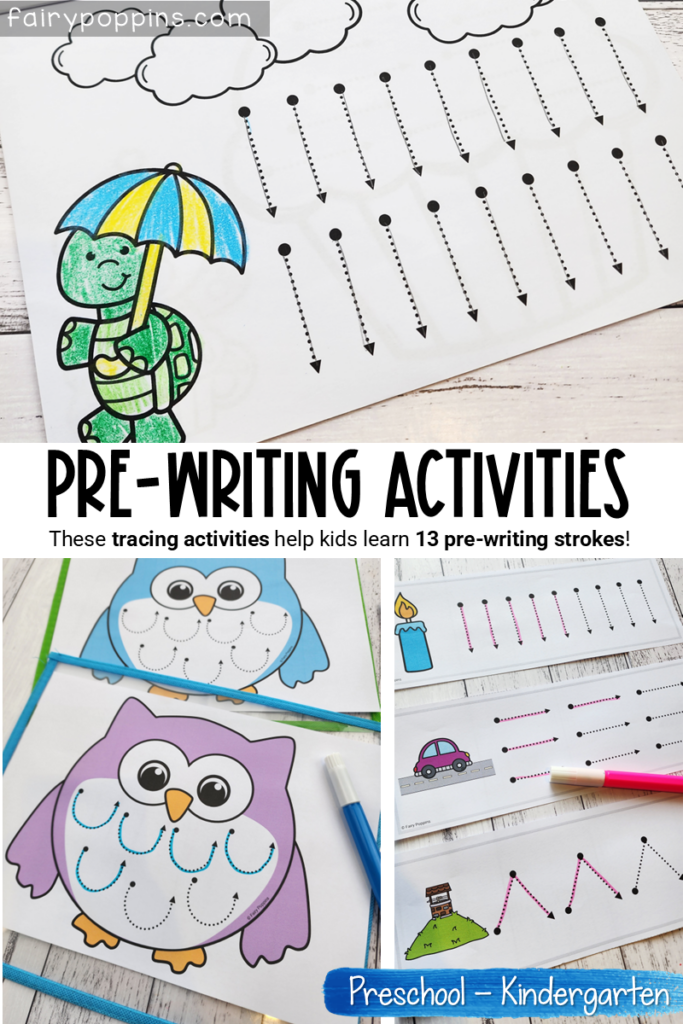These pre-writing practice activities are a fun way for children to learn pre-writing strokes. They’re best suited to Preschool, Pre-K and Kindergarten.
As Preschool and Kindergarten teachers, we understand that writing is a fundamental skill that children will carry with them throughout their lives. But before they can master letters and words, there’s an essential step they need to take: pre-writing strokes. These are the foundational movements that children need to develop before they can write letters and numbers with ease and confidence. If you’re looking for effective ways to help your students build these crucial skills, my set of pre-writing practice activities, including tracing activities, worksheets, and assessments, is exactly what you need.
<<Pre-Writing Tracing Mats>>
Here’s why pre-writing strokes are so important and how targeted activities can support your teaching.
What Are Pre-Writing Strokes?
Pre-writing strokes are the basic shapes and lines that form the building blocks of writing. These include straight lines, circles, zigzags, and curves. Mastering these strokes is critical because they are the components of letters and numbers. For example, to write the letter ‘A,’ children need to draw diagonal and horizontal lines. By practicing these strokes, children develop the muscle memory and control needed for writing.
<<Tracing Mats>>
Why Pre-Writing Strokes Matter
- Building Fine Motor Skills
Writing various strokes strengthens the small muscles in children’s hands and fingers, improving their grip and control over writing tools. - Improving Hand-Eye Coordination
Tracing various pre-writing lines enhances children’s ability to coordinate hand movements with what they see, which is crucial for writing. - Developing Confidence and Independence
Successfully drawing basic shapes boosts children’s confidence, encouraging them to tackle more challenging writing tasks on their own. - Laying the Foundation for Literacy
Learning writing strokes helps children recognize and practice the shapes that form letters, laying the groundwork for early literacy.<<Pre-Writing Practice Mats>>
How Pre-Writing Practice Activities Can Help
My pre-writing practice activities are carefully designed to support young learners as they develop these crucial skills. Here’s what you can expect:
- Tracing Activities: These activities guide children through the process of drawing lines, shapes, and simple patterns. Tracing helps them develop the muscle memory needed for writing.
- Worksheets: The pre-writing worksheets offer a variety of pre-writing exercises that are both fun and educational. They are perfect for classroom use or as take-home practice.
- Assessments: To track your students’ progress, I’ve included a set of assessments. You can use these to identify areas where a child may need additional support.
<<Practice Worksheets>>
Tips for Using Pre-Writing Activities in Your Classroom
- Start Simple: Begin with basic shapes like lines and circles before moving on to more complex patterns.
- Make It Fun: Incorporate games and creative activities to keep children engaged.
- Be Patient: Every child develops at their own pace, so give them the time they need to master each step.
- Celebrate Success: Praise children for their efforts and progress, no matter how small.
<<Pre-Writing Lines Tracing Strips>>
<<Pencil Control Tracing Strips>>
Conclusion
Pre-writing strokes are the foundation of successful writing, and helping your students master these skills is one of the most important steps you can take as an early childhood educator. Our set of pre-writing practice activities, including tracing activities, worksheets, and assessments, is designed to make this process both effective and enjoyable for your students.
Equip your classroom with my comprehensive pre-writing practice pack today and give your students the tools they need to become confident, successful writers!
More Fine Motor Activities
You may also find the following activities helpful. The alphabet mats include pre-writing lines that can be traced or decorated with loose parts.

